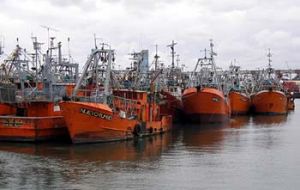MercoPress. South Atlantic News Agency
Argentina: Sector profits squeezed by rising costs
 Fuel costs eat up half of the harvest returns of the Mar del Plata coastal fleet.
Fuel costs eat up half of the harvest returns of the Mar del Plata coastal fleet. Rising fuel prices, tax and wage increases, and market instability in terms of the future has stoked great concern and uncertaintly among those involved in the national fishing sector.
"The exhaustion of the fishing sector's economic model in the last four years is evident," said Mariano Perez, president of the Chamber of the Argentine Fishing Industry (CAIPA), which concentrates more than 20 port market business groups. "Since 2001, the price of fuel has increased by more than 200 per cent, wages jumped by more than 230 per cent, and supply costs have increased apace with the euro, as have vessel parts and oil derivatives," the leader told Diario Hoy. He believes it is necessary to change the sector's economic policy to one that foments production rather than marginalise it. "The sector's renewal brought about by the currency devaluation is no longer enough to provide for continued growth and business investment in that the future is still so uncertain," stated the leader. Meanwhile, Mariano Retrivi, manager of the Coastal Fisheries Vessels Association, an umbrella organisation for 40 business executives from Buenos Aires and around 65 vessels, confirmed his sector's main concern is the rising price of fuel, "which makes it impossible to continue working." "The prices of fisheries commodities are stable - some may even fall in the short-run. However, profitability has diminished in this context," said Antonio Solimeno, head of the Mar del Plata-based business group of the same name. The company operates four big processing plants and more than 15 vessels. "The re-imbursement system of internal tax refunds is a good mechanism, but the way it is being carried out has had an overall innocuous effect on Mar del Plata and [Buenos Aires] provincial business," said Perez. "Although there are things that need to be corrected, the need for tax reimbursements is being acknowledged," commented Oscar Fortunato, president of the Argentine Fishing Company Council (CEPA). "I believe it is important that the Government warn that there is an ongoing crisis in the sector," said the business executive. Last week, representatives of the Coastal Fishing Vessels Association presented a document detailing the problems caused by the increase in fuel costs and its sector impact to Argentine President Cristina Fernandez de Kirchner. "Today, half of a vessel's fish load goes towards the payment of fuel," reads the document. "We have a pressing need for governmental action of a kind that would prevent us from sliding into a grave crisis," coastal sector representatives stated. In March, the Argentine Fisheries Subsecretariat published a report in which it depicted and analysed the situation of two of the most important Argentine fisheries, that is, squid (Illex argentinus) and prawn (Pleoticus muelleri). "Both [fisheries] are going through a critical period featuring a systematic drop in international prices and and increasing production costs - a terrible combination that leads to increasing unprofitability and diminishing activity," acknowledged the government body in its report.(FIS)




Top Comments
Disclaimer & comment rulesCommenting for this story is now closed.
If you have a Facebook account, become a fan and comment on our Facebook Page!